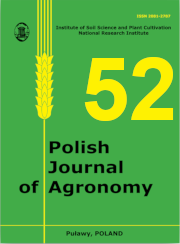Potential of using digestate to regenerate soil and stimulate its biological life
##plugins.themes.bootstrap3.article.main##
Abstrakt
The future of humans and our planet, and food security, require innovative insights across many sectors of the economy (industry, agriculture, forestry, science and technology development). Reducing the use of chemicals, recycling carbon and recovering nutrients, caring for soil health, producing healthy food and adapting to climate change are the main challenges facing modern agriculture. The high proportion of soils low in organic matter, combined with manure shortages in some regions of Poland, poses a serious problem for maintaining the soil’s ability to perform productive and environmental functions. The use of selectively collected biodegradable waste, which contains significant amounts of organic matter, can be a key strategy for supplementing soil organic matter deficits. Green waste, kitchen waste, plant biomass produced in agriculture are valuable materials that, when processed through energy production,should become biofertilisers in line with the circular economy. Soil micro-organisms play an important role in the decomposition of organic matter and participate in the circulation and provision of nutrients to plants. Their role also includes fixing atmospheric nitrogen, stabilising soil aggregates, participating in the formation of soil humus and detoxifying soil from harmful substances present in the soil environment. Research to date confirms that biogas plant digestate can be a valuable fertiliser and has the potential to restore soil biological quality. There are virtually no reports indicating a negative effect of the digestate on the biological quality of the soil, especially when using digestate from agricultural substrates. This fact indicates that the potential of digestate in soil regeneration is significant, given its effects on soil biology, soil carbon and nutrient provision, and soil structure. It is more difficult to assess the impact of the digestate on soil biodiversity, especially the structure of the microbial population, which is strongly dependent on a number of soil, climatic and crop influences. An important aspect this review is the presentation of research needs for the potential of using digestate to regenerate soil and stimulate its biological life.
##plugins.themes.bootstrap3.article.details##

Utwór dostępny jest na licencji Creative Commons Uznanie autorstwa – Na tych samych warunkach 4.0 Miedzynarodowe.
Autor udziela redakcji czasopisma Polish Journal of Agronomy (w skrócie: PJA) licencji niewyłącznej i nieodpłatnej na korzystanie z autorskich praw majątkowych do wersji papierowej/drukowanej i elektronicznej utworu Autora opublikowanego w PJA w kraju i za granicą, w całości lub w dowolnej części, w tym umieszczanie utworu w elektronicznych bazach/zbiorach danych lokalnych lub dostępnych w Internecie, przez czas nieograniczony na polach eksploatacji określonych w art. 50 ustawy o prawie autorskim i prawach pokrewnych.
Prace wydane w Polish Journal of Agronomy są udostępniane na licencji Creative Commons Uznanie autorstwa-Na tych samych warunkach 4.0 (CC-BY-SA).

